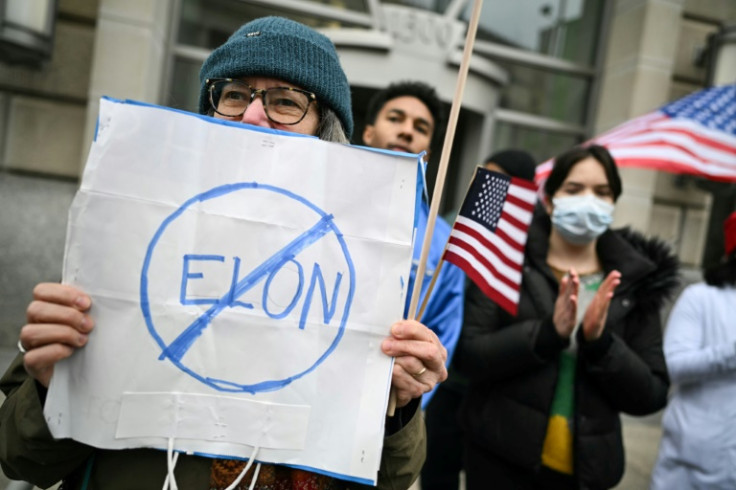Trump Tries to Tame DOGE with 'Big, Beautiful Bill'—But the Court Says Musk Still Runs the Show
A federal judge ruled Musk's DOGE leadership 'continuing and permanent'

In an unusual departure from his support to President Trump's policies, billionaire Elon Musk has expressed his disappointment over passage of the Domestic Policy Bill which he stated undermines the work of Department of Government Efficiency or DOGE.
The Domestic Policy Bill was passed by House Republicans last week and received strong backing from President Trump.
Musk, who recently stepped back from heading DOGE made these remarks during an exclusive CBS Sunday Morning broadcast interview.
'I was disappointed to see the massive spending bill, frankly, which increases the budget deficit, not just decreases it, and undermines the work that the DOGE team is doing,' Elon Musk said.
Musk's Disappointment Over Spending Bill
Musk has supported the expansive spending package earlier. This legislation, which awaits Senate approval, aims to prolong Trump's well-known 2017 tax cuts, raise expenditures for border security, introduce work mandates for Medicaid, and reverse clean energy tax incentives.
According to the Congressional Budget Office, the tax components of the package, officially named the 'One Big Beautiful Bill Act' after President Trump's own label for it, are projected to raise the deficit by $3.8 trillion (£2.81 trillion) by 2034.
PASSED: THE ONE BIG BEAUTIFUL BILL ACT.
— House Republicans (@HouseGOP) May 22, 2025
House Republicans just passed this HISTORIC piece of legislation FOR YOU. pic.twitter.com/keVGJstR6c
'I think a bill can be big or it can be beautiful,' Musk told CBS News, 'but I don't know if it can be both. My personal opinion.'
During the initial months of the Trump administration, Musk remained a frequent fixture as his DOGE staff moved through almost every government agency enacting extensive cuts. This action sparked apprehension among Democrats, some of Trump's supporters, and several legal disputes.
Musk, who also leads Tesla, SpaceX, and the social media platform X, has indicated his intention to reduce his participation in government affairs. However, despite his stated intention, a recent federal court ruling has presented a different perspective on Musk's ongoing role.
Judge Rules Musk's Leadership of DOGE Is Enduring
A district court judge in Washington, D.C., stated in an order released Tuesday that the White House had 'unsuccessfully' attempted to characterise Musk's position in the federal government as temporary to achieve the dismissal of a lawsuit filed against Musk, DGE, and Trump.
New Mexico led a coalition of 14 states that had filed a lawsuit against Musk, DOGE, and Trump in February, citing alleged constitutional violations. The attorneys general for these states contended that Musk did not possess the legal power to implement extensive reductions and other alterations within the federal government, as the Senate had not confirmed him, and Congress had never formally approved DOGE.
White House Efforts To Downplay Musk's Role Fail
In a motion submitted with the aim of dismissing the case, White House attorneys described Musk as holding solely an advisory and temporary position within the Trump administration.
Federal court Judge Tanya Chutkan determined that Musk's influence spans the entire executive branch, appearing boundless, despite the White House's efforts to 'minimise Musk's role, framing him as a mere advisor without any formal authority.'
Judge Chutkan noted that the 14 states presented a convincing argument that the tech billionaire and major Trump donor now 'occupies a continuing position' and 'exercises significant authority,' entirely without 'proper appointment' by Congress.
She also noted that the states' claims that DOGE had obtained 'unauthorised access' to 'private and proprietary information' were 'sufficient to allege an injury,' allowing the case to proceed.
With a stated mission of fiscal discipline, Musk has directed the DOGE initiative to remove specific federal offices, reduce regulations, and quickly decrease the federal workforce, concurrently reprogramming or deleting some government websites, software, and systems.
President Trump No More Defendant in Case
Judge Chutkan ruled that Trump could be removed as a defendant in the case, stating on Tuesday that the court 'may not enjoin the President in the performance of his official duties.' She noted that the president possesses 'highly discretionary' power to choose and propose officers under the Appointments Clause of the US Constitution.
© Copyright IBTimes 2025. All rights reserved.






















